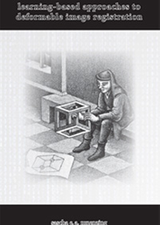Learning-based approaches to deformable image registration
S. Muenzing
- Promotor: M. Viergever and B. van Ginneken
- Copromotor: J. Pluim
- Graduation year: 2014
- Utrecht University
Abstract
Accurate registration of images is an important and often crucial step in many areas of image processing and analysis, yet it is only used in a small percentage of possible applications. Automated registration methods are not considered to be sufficiently robust to handle complex deformations and locally deviating intensities. The motive of this research has therefore been the development of methodology that learns to cope with such situations, from example registrations defined by experts. Image processing by learning has been successfully applied for image segmentation, but the concept is new to image registration. Thus, the research question of this thesis is in general:-How can machine learning be employed to improve deformable image registration?The developed methods were evaluated on registration of lung CT scans, in which two separate registration tasks were examined: change detection in follow-up scans and registration of inspiration and expiration images. The results of this research are presented in the following chapters. Chapter 2 presents an automatic method for quality assessment of medical image registration. It can be seen as a CAD system for detection and classification of registration errors. In Chapter 3, a boosting method (machine learning) is described that can improve state-of-the art image registration methods. Chapter 4 describes a meta-registration algorithm (machine learning) that automatically combines registrations obtained by different methods in order to arrive at an improved image registration result. Chapter 5 presents a knowledge model (machine learning) for local regularization of nonparametric registration methods. The thesis ends with a summary and general discussion in Chapter 6.
